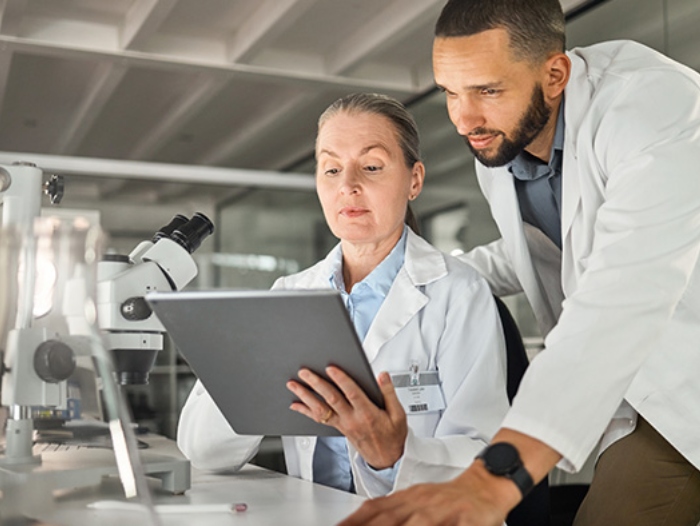Auto logout in seconds.
Continue LogoutFor years, experts have warned that blue light from phones and laptops keeps us alert, making it harder to fall — and stay — asleep. But sleep scientists are now rethinking how screen use actually affects rest, Caroline Hopkins Legaspi reports for The New York Times.
Does blue light actually impact your sleep?
The long-standing theory is that blue light from phones, laptops, and televisions suppresses melatonin, the hormone that signals drowsiness. "As a result, you feel more alert, making it harder to fall — and stay — asleep," Legaspi writes.
However, some researchers caution that the relationship between blue light and sleep isn't so straightforward, with research on the topic being mixed. Many older studies were smaller and conducted in carefully controlled laboratories, limiting how much they reflect real life.
While it's true that blue light can lower melatonin, current evidence, albeit limited, suggests that screen use is not always behind the decline, said Mariana Figueiro, a scientist at the Icahn School of Medicine at Mount Sinai who studies light and health.
According to Figueiro's research, "how long you use your device for, how close it is to your eyes and how bright it is may play a role," Legaspi writes. In a 2013 study, Figueiro found that using an iPad at full brightness for two hours caused a small dip in melatonin, but one hour of use made no difference. In 2014, she found that watching television from nine feet away had no effect, while a 2018 study showed that using an iPad at higher brightness suppressed melatonin more than using it at dimmer light.
Daylight exposure also seems to shape nighttime responses. People who get more sunlight during the day appear to be less sensitive to blue light later in the day. Some people are also naturally less sensitive. In a 2019 study, one participant required 40 times more light exposure to suppress melatonin than the most sensitive participant.
Separately, a 2022 review of 12 studies found that most of the studies showed no link between blue light and poor sleep, though a few did. Last year, the National Sleep Foundation concluded that there was not "enough evidence to demonstrate that blue light exposure from screen use before bed can impair sleep," Legaspi writes.
Why your screen habits matter more
If blue light isn't always to blame, researchers say attention should shift to how people use their devices. According to Lauren Hartstein, an assistant professor of psychiatry at the University of Arizona, some research suggests that what people do on their devices can have a big impact on their sleep.
Interactive activities, including playing video games, browsing social media, shopping, and gambling, appear the most disruptive. Daniel Buysse, a psychiatrist and professor at the University of Pittsburgh, also called out social media as being particularly concerning since it's designed to hold users' attention for as long as possible.
These behaviors stimulate the brain's reward system, making it difficult to disengage. As Hartstein put it, you can switch your device off, but "you can't turn your brain off."
A 2024 study of around 500 teenage boys found those who texted, gamed, or talked on devices before bed tended to fall asleep later and slept for fewer hours than peers who did not engage in those activities. But those who watched television or movies reported no difference in sleep compared with peers who did not.
Content choices play a role, too. Starting a suspenseful new show or book may delay sleep, while familiar or light material may have the opposite effect. For some patients, the right distraction can even be therapeutic. According to Aric Prather, a psychologist at the University of California, San Francisco, who treats insomnia, the "sweet spot" seems to be something positive and familiar, such as a scripted comedy show. One of his patients relies on It's Always Sunny in Philadelphia as a "go-to rumination killer."
related resources
- Can't sleep? Here are 17 tips that can help.
- 3 trends in sleep services providers should be prepared for
- Blue light glasses are booming — but do they really work? Here's what the science says.
- Is screen time before bed bad for you? What new research suggests.
- How using 'sleep as medicine' can help hospitalized patients recover more quickly
Experts advise people to keep devices out of bed. According to Hartstein, this separation helps your brain associate your bed with sleep rather than whatever you might be watching or reading.
More research is needed
The conflicting science on blue light has led specialists to move away from one-size-fits-all warnings. Hartstein stressed that focusing only on blue light misses the broader picture. "The link between blue light and sleep is murkier than we thought," she said.
Figueiro echoed that even when blue light from screens lowers melatonin, the effect may be too small to matter. "It's still not clear whether the levels of melatonin suppression from screen exposure are enough to impair sleep in the first place," she said.
For Allison Harvey, a professor and clinical psychologist at the University of California, Berkeley, the key message is that evidence remains limited. "We really need more research," she said.
In the meantime, experts recommend paying attention to both habits and personal outcomes. Ultimately, Hartstein said, the real test is whether you wake up feeling restored. "If you are able to fall asleep quickly, you sleep well throughout the night, and you feel rested the next day, then that's great," she said. "You don't need to constantly adjust your behaviors."
(Legaspi, New York Times, 8/17)
Don't miss out on the latest Advisory Board insights
Create your free account to access 1 resource, including the latest research and webinars.
Want access without creating an account?
You have 1 free members-only resource remaining this month.
1 free members-only resources remaining
1 free members-only resources remaining
You've reached your limit of free insights
Become a member to access all of Advisory Board's resources, events, and experts
Never miss out on the latest innovative health care content tailored to you.
Benefits include:
You've reached your limit of free insights
Become a member to access all of Advisory Board's resources, events, and experts
Never miss out on the latest innovative health care content tailored to you.
Benefits include:
This content is available through your Curated Research partnership with Advisory Board. Click on ‘view this resource’ to read the full piece
Email ask@advisory.com to learn more
Click on ‘Become a Member’ to learn about the benefits of a Full-Access partnership with Advisory Board
Never miss out on the latest innovative health care content tailored to you.
Benefits Include:
This is for members only. Learn more.
Click on ‘Become a Member’ to learn about the benefits of a Full-Access partnership with Advisory Board
Never miss out on the latest innovative health care content tailored to you.



